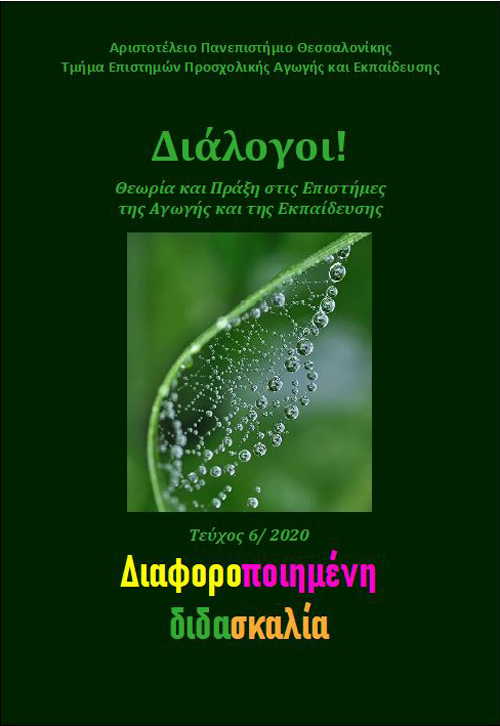Διδακτορική διατριβή: Η επίδραση της διαφοροποιημένης διδασκαλίας στη μαθησιακή επίδοση των παιδιών νηπιαγωγείου

Περίληψη
Η Διαφοροποιημένη Διδασκαλία (ΔΔ) προσφέρει ένα πλαίσιο αξιοποίησης της διαφορετικότητας των παιδιών, με σκοπό τη μεγιστοποίηση της μάθησης. Η παρούσα διατριβή εστίασε στη σχέση της ΔΔ με την επίδοση των νηπίων στο πλαίσιο της διαθεματικότητας. Εφαρμόστηκε ημι-πειραματική έρευνα με 80 παιδιά στην πειραματική ομάδα και 74 στην ομάδα ελέγχου. Τα δεδομένα συλλέχθηκαν με ατομικές συνεντεύξεις προ- και μετά-ελέγχου και αναλύθηκαν με στατιστικά τεστ και Ανάλυση Περιεχομένου. Για τη διασφάλιση της πιστότητας των διαφοροποιημένων παρεμβάσεων, αναπτύχθηκε ένα πρόγραμμα Επαγγελματικής Ανάπτυξης των νηπιαγωγών της πειραματικής ομάδας. Από τα αποτελέσματα φάνηκε ότι η ΔΔ ήταν πιο αποτελεσματική στην επίτευξη υψηλότερης επίδοσης σε σύγκριση με τη διδασκαλία προς το μέσο επίπεδο, αλλά και ο αντισταθμιστικός της ρόλος μεταξύ διαφορετικών ομάδων παιδιών. Συνεπώς, τα επιμέρους στοιχεία της ΔΔ (π.χ. ελευθερία επιλογής, εργασία σε ομάδες, αυτενέργεια) προώθησαν την αυξημένη εμπλοκή των παιδιών στη διαδικασία της μάθησης, οδηγώντας σε καλύτερα μαθησιακά αποτελέσματα.
Λεπτομέρειες άρθρου
- Πώς να δημιουργήσετε Αναφορές
-
Μαβίδου Α. (2020). Διδακτορική διατριβή: Η επίδραση της διαφοροποιημένης διδασκαλίας στη μαθησιακή επίδοση των παιδιών νηπιαγωγείου. Διάλογοι! Θεωρία και πράξη στις επιστήμες αγωγής και εκπαίδευσης, 6, 301–318. https://doi.org/10.12681/dial.25561
- Τεύχος
- Τόμ. 6 (2020)
- Ενότητα
- Ανταποκρίσεις και Παρουσιάσεις

Αυτή η εργασία είναι αδειοδοτημένη υπό το CC Αναφορά Δημιουργού – Μη Εμπορική Χρήση – Παρόμοια Διανομή 4.0.
Οι συγγραφείς των άρθρων που δημοσιεύονται στο Διάλογοι! Θεωρία και Πράξη στις Επιστήμες Αγωγής και Εκπαίδευσης διατηρούν τα δικαιώματα πνευματικής ιδιοκτησίας επί των άρθρων τους, δίνοντας στο περιοδικό το δικαίωμα της πρώτης δημοσίευσης. Άρθρα που δημοσιεύονται στο Διάλογοι! Θεωρία και Πράξη στις Επιστήμες της Αγωγής και Εκπαίδευσης διατίθενται με άδεια Creative Commons 4.0 και σύμφωνα με την άδεια μπορούν να χρησιμοποιούνται ελεύθερα, με αναφορά στον/στη συγγραφέα και στην πρώτη δημοσίευση για μη κερδοσκοπικούς σκοπούς και με δικαίωμα τροποποίησης μόνον με παρόμοια διανομή (αν αναμείξετε, τροποποιήσετε, ή δημιουργήσετε πάνω στο υλικό, πρέπει να διανείμετε τις δικές σας συνεισφορές υπό την ίδια άδεια όπως και το πρωτότυπο).
To Τμήμα Επιστημών Προσχολικής Αγωγής και Εκπαίδευσης του Αριστοτέλειου Πανεπιστημίου Θεσσαλονίκης και το Εθνικό Κέντρο Τεκμηρίωσης διατηρούν το δικαίωμα να δημοσιεύουν, να αναπαραγάγουν, να παρουσιάζουν στο κοινό, να διανέμουν και να χρησιμοποιούν άρθρα που δημοσιεύονται στο Διάλογοι! Θεωρία και Πράξη στις Επιστήμες Αγωγής και Εκπαίδευσης σε οποιοδήποτε μέσο και μορφή είτε μεμονωμένα είτε ως μέρη συλλογικών έργων, για όλο το χρόνο διάρκειας προστασίας της πνευματικής ιδιοκτησίας και για όλες τις χώρες του κόσμου.
Αυτό περιλαμβάνει ενδεικτικά, και όχι αποκλειστικά, το δικαίωμα δημοσίευσης των άρθρων σε τεύχη του περιοδικού Διάλογοι! Θεωρία και Πράξη στις Επιστήμες Αγωγής και Εκπαίδευσης, αναπαραγωγής και διανομής μεμονωμένων αντιγράφων των άρθρων, αναπαραγωγής ολόκληρων των άρθρων σε άλλη έκδοση του Τμήματος Επιστημών Προσχολικής Αγωγής και Εκπαίδευσης του Αριστοτέλειου Πανεπιστημίου Θεσσαλονίκης και του Εθνικού Κέντρου Τεκμηρίωσης και αναπαραγωγής και διανομής των άρθρων ή περίληψης αυτών με χρήση πληροφορικού συστήματος αποθετηρίου.


